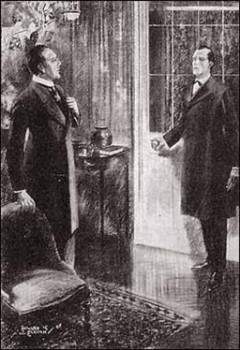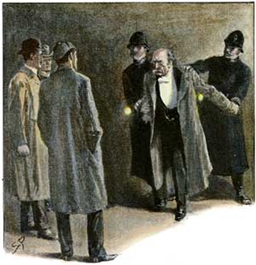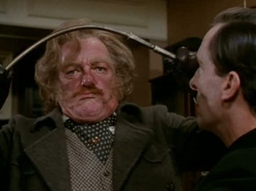The Public Life of Sherlock Holmes: Don’t Piss Off Sherlock Holmes
 A few weeks ago, I speculated a bit on what might have really happened in “The Problem of Thor Bridge.” I had already offered you, good reader, a few alternatives to Watson’s recorded accounts, such as this one for “The Abbey Grange.” I believe that “The Illustrious Client” is one of Doyle’s better tales. Granada also made a fine version for their Jeremy Brett series. This week, I again veer from Watson’s (dare I say, ‘fawning’) view of matters.
A few weeks ago, I speculated a bit on what might have really happened in “The Problem of Thor Bridge.” I had already offered you, good reader, a few alternatives to Watson’s recorded accounts, such as this one for “The Abbey Grange.” I believe that “The Illustrious Client” is one of Doyle’s better tales. Granada also made a fine version for their Jeremy Brett series. This week, I again veer from Watson’s (dare I say, ‘fawning’) view of matters.
SPOILERS SPOILERS SPOILERS
I feel silly putting spoiler alerts before discussing stories that were often written a century or more before. But if you haven’t read the story yet, click here before continuing on. Okay, back? Pretty good story, eh? Now, let’s have an alternate take:
The vile Baron Gruner had illy used and cast aside many women, including Kitty Winter. She says to Holmes, “Let me see this man in the mud, and I’ve got all I worked for – in the mud with my foot on his cursed face. That’s my price. I’m with you tomorrow or any other day so long as you are on his track.”
Clearly, Winter is willing to help Holmes bring down Baron Gruner. She certainly seems dedicated to the task. When it is time to sneak into Gruner’s house and steal a book that will expose his vile ways, Holmes brings Winter with him. Presumably, this was so she could show him where it was. He tells Watson that he couldn’t know “what the little packet was that she carried so carefully under her cloak.”

His wording indicates that he was aware of the packet before she attacked Gruner. If not, he would likely have said something along the lines of “I was not aware at that time that she was carrying the vitriol” or the like. We will give Holmes the benefit of the doubt and believe that he knew Kitty Winter had something with her, but he did not know what.
Winter’s hatred of Baron Gruner rivals the strongest emotions of any other person in the Canon. Any secret object that she brings into Gruner’s presence is certainly not for his benefit. Assuming Holmes did need her to quickly find the hidden book, was he willing to overlook any seemingly minor item regarding her?
He had a plan and either needed her to execute it, or did not want her disrupting it by acting on her own. Or can we instead assume that Holmes knew what Kitty Winter was bringing? Or…was Holmes just acting in accord to something he said in “A Scandal in Bohemia,” “Women are naturally secretive, and they like to do their own secreting.”
From here on, actions seem to eerily resemble the tiger-trapping method that Holmes referred to when capturing Colonel Sebastian Moran in “The Adventure of the Empty House.” Holmes explains that a hunter would tie a young kid (lamb) under a tree and then climbed up into the tree.
He would wait there until the tiger came for the bait, at which point he would shoot the tiger. In that instance, Holmes was the hunter, Moran the tiger, the empty house the tree and the wax bust in Baker Street the bait.
Holmes finds the hidden book. We have no evidence that Kitty Winter entered the house at all, though according to Holmes’ story, it seems that she would have, to help him locate the book. If she did go inside, she crawled back outside via a window to the garden while Holmes was still inside.
Baron Gruner, about to rough up Watson, hears a noise and rushes into the next room, followed by Watson. The previously mentioned window is open and standing next to it is Sherlock Holmes. He jumps out the window into the garden and Gruner rushes after him to the open window.
At that moment, Kitty Winter, hidden amongst the shrubbery, throws acid into Gruner’s face. Later, Holmes expresses surprise at Winter’s actions. But let us recall the hunter’s tiger trap.
 Holmes (the planner of the affair) is the bait, making a noise and standing by the open window, which is the tree. Kitty Winter is the hunter, and Gruner is the tiger. He comes for the bait at the tree and the hunter nails him, though her weapon is acid, not a gun.
Holmes (the planner of the affair) is the bait, making a noise and standing by the open window, which is the tree. Kitty Winter is the hunter, and Gruner is the tiger. He comes for the bait at the tree and the hunter nails him, though her weapon is acid, not a gun.
Surely this is more plausible than Holmes’ professed ignorance regarding the contents of Winter’s hidden packet. I prefer my Holmes to be cunning, not clueless. Holmes has arranged this trap for Gruner, just as he once did for Moran. Not only has Holmes obtained the evidence needed to break the spell on Violet de Merville, but he arranges for Gruner to pay for his past sins.
I would suggest that an examination of this issue could hinge on one key question: Did Holmes intentionally or accidentally make the noise that drew Baron Gruner into the next room? If it was intentional, then I assert that the evidence supports the theory that Holmes and Winter conspired together to disfigure Gruner.
If it was an accidental noise and Holmes was attempting to quietly escape with the book, then the tiger trap analogy is still appropriate, except that it is Kitty Winter who is the planner. Holmes is unknowing bait in this case, instead of a co-conspirator with Winter.
It is rather disturbing to think that Holmes was making his escape through the garden, leaving Watson to fend for himself against an enraged villain capable of nearly anything. This does not seem characteristic of their friendship and I prefer to believe that Holmes intentionally drew Gruner to the window.
So, looking at a few other villains who ran into the Holmes buzz saw…

It should come as no surprise that those ne’er do wells which choose to confront Holmes in his Baker Street lodgings suffer very unpleasant consequences. Charles Augustus Milverton is just one of several villains who pay a steep price for their cheekiness.
Milverton visits Baker Street in an attempt to conduct some business (albeit, an illegal and unsavory business). Holmes and Watson attempt to wrest a notebook from him by force, but Milverton pulls out a gun and brandishes it at the two men, making it very clear that he will shoot them. Since Watson is holding a chair with which he would gladly bash Milverton, the visitor is ready to meet force with greater force.
When Milverton smugly walks out the door of Baker Street, he is a marked man. He is soon dead, Holmes and Watson secretly watching a woman gun him down in his own study. Holmes made no move to prevent Milverton’s death. For all we know, Holmes himself brought a gun on his burglary outing and was going to kill Milverton himself. In fact, I wrote some thoughts about the real reason for that sneaky mission here.
This would explain his not wanting Watson to come along. Threaten to shoot Holmes in his own sitting room and you end up dead very soon thereafter.
 In “The Speckled Band,” Grimesby Roylott confronts Holmes in a memorable Baker Street scene. When he storms out, he has already signed his own death warrant. Holmes whips a deadly snake back towards Roylott. The villain is dead, his own daughter conspires with Holmes to cover it up and the incident is dismissed as a tragic accident. Wow.
In “The Speckled Band,” Grimesby Roylott confronts Holmes in a memorable Baker Street scene. When he storms out, he has already signed his own death warrant. Holmes whips a deadly snake back towards Roylott. The villain is dead, his own daughter conspires with Holmes to cover it up and the incident is dismissed as a tragic accident. Wow.
In “The Final Problem,” the infamous Professor Moriarty comes to Baker Street (later setting it on fire!) and tells Holmes that if the detective does not leave him alone, Moriarty will destroy him. Holmes even admits to feeling fear when the Professor confronts him. How does Holmes solve the problem? He baits Moriarty away from London, ensuring that the Professor will escape the police net that Holmes himself has woven. Then he throws Moriarty off a ledge and to the base of a waterfall. Talk about taking matters into your own hands!
It can be a very dangerous move for a villain to stop by Baker Street to threaten Sherlock Holmes in person! But of course, Baron Gruner learned that even home is not safe from Holmes. He arranged to have Holmes beaten. How did that work out for you, Baron?
Are all of these incidents coincidence? Possibly, but like Holmes himself, I distrust coincidence
You can read Bob Byrne’s ‘The Public Life of Sherlock Holmes’ column here at Black Gate every Monday morning.
He founded www.SolarPons.com, the only website dedicated to the ‘Sherlock Holmes of Praed Street’ and blogs about Holmes and other mystery matters at Almost Holmes.
His “The Adventure of the Parson’s Son” is included in the largest collection of new Sherlock Holmes stories ever published